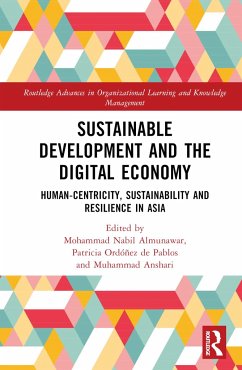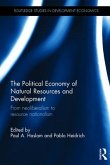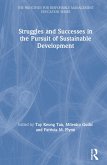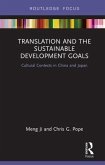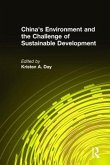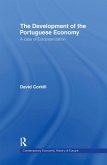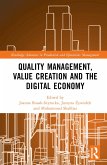Sustainable Development and the Digital Economy
Human-centricity, Sustainability and Resilience in Asia
Herausgeber: Almunawar, Mohammad Nabil; Anshari, Muhammad; Ordóñez de Pablos, Patricia
Sustainable Development and the Digital Economy
Human-centricity, Sustainability and Resilience in Asia
Herausgeber: Almunawar, Mohammad Nabil; Anshari, Muhammad; Ordóñez de Pablos, Patricia
- Gebundenes Buch
- Merkliste
- Auf die Merkliste
- Bewerten Bewerten
- Teilen
- Produkt teilen
- Produkterinnerung
- Produkterinnerung
As Asian nations are moving fast toward the digital economy, this edited collection offers new perspectives on understanding emerging business opportunities as well as the challenges faced. Chapters span the three pillars of industry 5.0, human centricity, sustainability and resilience.
Andere Kunden interessierten sich auch für
![The Political Economy of Natural Resources and Development The Political Economy of Natural Resources and Development]() The Political Economy of Natural Resources and Development206,99 €
The Political Economy of Natural Resources and Development206,99 €![Struggles and Successes in the Pursuit of Sustainable Development Struggles and Successes in the Pursuit of Sustainable Development]() Struggles and Successes in the Pursuit of Sustainable Development195,99 €
Struggles and Successes in the Pursuit of Sustainable Development195,99 €![Translation and the Sustainable Development Goals Translation and the Sustainable Development Goals]() Meng JiTranslation and the Sustainable Development Goals74,99 €
Meng JiTranslation and the Sustainable Development Goals74,99 €![The Sustainable Development Goals The Sustainable Development Goals]() Martin WynnThe Sustainable Development Goals195,99 €
Martin WynnThe Sustainable Development Goals195,99 €![China's Environment and the Challenge of Sustainable Development China's Environment and the Challenge of Sustainable Development]() Kristen A. DayChina's Environment and the Challenge of Sustainable Development281,99 €
Kristen A. DayChina's Environment and the Challenge of Sustainable Development281,99 €![Development of the Portugese Economy Development of the Portugese Economy]() David CorkhillDevelopment of the Portugese Economy302,99 €
David CorkhillDevelopment of the Portugese Economy302,99 €![Quality Management, Value Creation, and the Digital Economy Quality Management, Value Creation, and the Digital Economy]() Quality Management, Value Creation, and the Digital Economy195,99 €
Quality Management, Value Creation, and the Digital Economy195,99 €-
-
-
As Asian nations are moving fast toward the digital economy, this edited collection offers new perspectives on understanding emerging business opportunities as well as the challenges faced. Chapters span the three pillars of industry 5.0, human centricity, sustainability and resilience.
Hinweis: Dieser Artikel kann nur an eine deutsche Lieferadresse ausgeliefert werden.
Hinweis: Dieser Artikel kann nur an eine deutsche Lieferadresse ausgeliefert werden.
Produktdetails
- Produktdetails
- Verlag: Routledge
- Seitenzahl: 292
- Erscheinungstermin: 6. Oktober 2023
- Englisch
- Abmessung: 240mm x 161mm x 20mm
- Gewicht: 605g
- ISBN-13: 9781032483825
- ISBN-10: 1032483822
- Artikelnr.: 69114560
- Herstellerkennzeichnung
- Libri GmbH
- Europaallee 1
- 36244 Bad Hersfeld
- gpsr@libri.de
- Verlag: Routledge
- Seitenzahl: 292
- Erscheinungstermin: 6. Oktober 2023
- Englisch
- Abmessung: 240mm x 161mm x 20mm
- Gewicht: 605g
- ISBN-13: 9781032483825
- ISBN-10: 1032483822
- Artikelnr.: 69114560
- Herstellerkennzeichnung
- Libri GmbH
- Europaallee 1
- 36244 Bad Hersfeld
- gpsr@libri.de
Mohammad Nabil Almunawar is currently an associate professor at the School of Business and Economics, Universiti Brunei Darussalam, Brunei Darussalam. His overall research interests include applications of IT in management, e-business/commerce, digital marketplace/platform, digital transformation, digital business ecosystem, health informatics, information security and cloud computing. Currently, he focuses his research on digital platforms and the digital business ecosystem. He is Editor in Chief International Journal of E-Business Research (IJEBR), an associate editor of International Journal of Asian Business and Information Management (IJABIM) and a member of many editorial boards of international journals. Patricia Ordóñez de Pablos is a full professor in the Department of Business Administration in the Faculty of Business and Economics at the University of Oviedo, Spain. She serves as Editor in Chief of Routledge book series Advances on Organizational Learning and Knowledge Management and Editor in Chief of IGI Global's International Journal of Asian Business and Information Management (IJABIM) and Editor in Chief Inderscience's International Journal of Learning and Intellectual Capital (IJLIC). Muhammad Anshari is a researcher and academic staff at the School of Business and Economics, Universiti Brunei Darussalam (UBD), Brunei Darussalam, and currently serves as Deputy Director Institute of Policy Studies at the same university. He received his BMIS (Hons) from International Islamic University, Malaysia, his Master of IT (E-Business) from James Cook University, Australia, and his PhD from UBD. His current research interests include business information systems, knowledge management systems, Industry 4.0, big data in business, FinTech and healthcare information systems.
Chapter 1: Talent management in the digital era. Chapter 2: Digital Talent
Management in Indonesia. Chapter 3: Digital Inclusion and Micro and Small
Enterprises: The Indonesia Story. Chapter 4: Collaborative Management in
Value Creation: Cases of SMEs. Chapter 5: Collaborative Youth Action to
Alleviate Digital Inequality in Rural Areas in Indonesia. Chapter 6: Home
Robots and Their Role in the Owners' Well-Being and Family Structure: A
Netnographic study with Japanese People. Chapter 7: Technology Support for
Circular Economy. Chapter 8: Technological change: Solar Coin and green
revolution of the oil and gas industry. Chapter 9: Featuring Digital Twins
in Healthcare Information Systems. Chapter 10: The Digital Economy and
Anthropocentric Sustainable Development: The Environmental Resilience of
the Asian Continent. Chapter 11: Social Media Exposure and COVID-19
Pandemic toward Sustainable Consumption Behaviour: An Investigation from
the Perspective of Indonesian Consumers. Chapter 12: Smart Urban
Governance: Implementation and Challenges in Southeast Asia. Chapter 13:
How (Islamic) Smart Cities 2.0 are Driving Inclusive Growth Opportunities
and Fighting Climate Change: Evidence from Asia-9. Chapter 14: Korea's
Citizen Centric Smart City Development by Adopting Methodologies of Living
Labs and Design Thinking and its Implications for the ASEAN Countries
Management in Indonesia. Chapter 3: Digital Inclusion and Micro and Small
Enterprises: The Indonesia Story. Chapter 4: Collaborative Management in
Value Creation: Cases of SMEs. Chapter 5: Collaborative Youth Action to
Alleviate Digital Inequality in Rural Areas in Indonesia. Chapter 6: Home
Robots and Their Role in the Owners' Well-Being and Family Structure: A
Netnographic study with Japanese People. Chapter 7: Technology Support for
Circular Economy. Chapter 8: Technological change: Solar Coin and green
revolution of the oil and gas industry. Chapter 9: Featuring Digital Twins
in Healthcare Information Systems. Chapter 10: The Digital Economy and
Anthropocentric Sustainable Development: The Environmental Resilience of
the Asian Continent. Chapter 11: Social Media Exposure and COVID-19
Pandemic toward Sustainable Consumption Behaviour: An Investigation from
the Perspective of Indonesian Consumers. Chapter 12: Smart Urban
Governance: Implementation and Challenges in Southeast Asia. Chapter 13:
How (Islamic) Smart Cities 2.0 are Driving Inclusive Growth Opportunities
and Fighting Climate Change: Evidence from Asia-9. Chapter 14: Korea's
Citizen Centric Smart City Development by Adopting Methodologies of Living
Labs and Design Thinking and its Implications for the ASEAN Countries
Chapter 1: Talent management in the digital era. Chapter 2: Digital Talent
Management in Indonesia. Chapter 3: Digital Inclusion and Micro and Small
Enterprises: The Indonesia Story. Chapter 4: Collaborative Management in
Value Creation: Cases of SMEs. Chapter 5: Collaborative Youth Action to
Alleviate Digital Inequality in Rural Areas in Indonesia. Chapter 6: Home
Robots and Their Role in the Owners' Well-Being and Family Structure: A
Netnographic study with Japanese People. Chapter 7: Technology Support for
Circular Economy. Chapter 8: Technological change: Solar Coin and green
revolution of the oil and gas industry. Chapter 9: Featuring Digital Twins
in Healthcare Information Systems. Chapter 10: The Digital Economy and
Anthropocentric Sustainable Development: The Environmental Resilience of
the Asian Continent. Chapter 11: Social Media Exposure and COVID-19
Pandemic toward Sustainable Consumption Behaviour: An Investigation from
the Perspective of Indonesian Consumers. Chapter 12: Smart Urban
Governance: Implementation and Challenges in Southeast Asia. Chapter 13:
How (Islamic) Smart Cities 2.0 are Driving Inclusive Growth Opportunities
and Fighting Climate Change: Evidence from Asia-9. Chapter 14: Korea's
Citizen Centric Smart City Development by Adopting Methodologies of Living
Labs and Design Thinking and its Implications for the ASEAN Countries
Management in Indonesia. Chapter 3: Digital Inclusion and Micro and Small
Enterprises: The Indonesia Story. Chapter 4: Collaborative Management in
Value Creation: Cases of SMEs. Chapter 5: Collaborative Youth Action to
Alleviate Digital Inequality in Rural Areas in Indonesia. Chapter 6: Home
Robots and Their Role in the Owners' Well-Being and Family Structure: A
Netnographic study with Japanese People. Chapter 7: Technology Support for
Circular Economy. Chapter 8: Technological change: Solar Coin and green
revolution of the oil and gas industry. Chapter 9: Featuring Digital Twins
in Healthcare Information Systems. Chapter 10: The Digital Economy and
Anthropocentric Sustainable Development: The Environmental Resilience of
the Asian Continent. Chapter 11: Social Media Exposure and COVID-19
Pandemic toward Sustainable Consumption Behaviour: An Investigation from
the Perspective of Indonesian Consumers. Chapter 12: Smart Urban
Governance: Implementation and Challenges in Southeast Asia. Chapter 13:
How (Islamic) Smart Cities 2.0 are Driving Inclusive Growth Opportunities
and Fighting Climate Change: Evidence from Asia-9. Chapter 14: Korea's
Citizen Centric Smart City Development by Adopting Methodologies of Living
Labs and Design Thinking and its Implications for the ASEAN Countries

